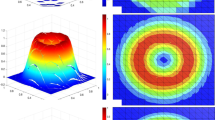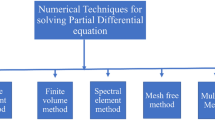Abstract
In this paper, a type of accurate a posteriori error estimator is proposed for the Steklov eigenvalue problem based on the complementary approach, which provides an asymptotic exact estimate for the approximate eigenpair. Besides, we design a type of cascadic adaptive finite element method for the Steklov eigenvalue problem based on the proposed a posteriori error estimator. In this new cascadic adaptive scheme, instead of solving the Steklov eigenvalue problem in each adaptive space directly, we only need to do some smoothing steps for linearized boundary value problems on a series of adaptive spaces and solve some Steklov eigenvalue problems on a low dimensional space. Furthermore, the proposed a posteriori error estimator provides the way to refine mesh and control the number of smoothing steps for the cascadic adaptive method. Some numerical examples are presented to validate the efficiency of the algorithm in this paper.
Similar content being viewed by others
References
Adams R-A. Sobolev Spaces. New York: Academic Press, 1975
Ahn H. Vibration of a pendulum consisting of a bob suspended from a wire. Quart Appl Math, 1981, 39: 109–117
Andreev A, Todorov T. Isoparametric finite-element approximation of a Steklov eigenvalue problem. IMA J Numer Anal, 2004, 24: 309–322
Armentano M, Padra C. A posteriori error estimates for the Steklov eigenvalue problem. Appl Numer Math, 2008, 58: 593–601
Arnold D, Falk S, Winther R. Preconditioning in H (div) and applications. Math Comp, 1997, 66: 957–984
Babuška I, Osborn J. Finite element-Galerkin approximation of the eigenvalues and eigenvectors of selfadjoint problems. Math Comp, 1989, 52: 275–297
Babuška I, Osborn J. Eigenvalue problems. In: Handbook of Numerical Analysis, vol. II. Finite Element Methods (Part 1). Amsterdam: North-Holland, 1991, 641–787
Babuška I, Rheinboldt W. Error estimates for adaptive finite element computations. SIAM J Numer Anal, 1978, 15: 736–754
Babuška I, Rheinboldt W. A-posteriori error estimates for the finite element method. Int J Numer Methods Eng, 1978, 12: 1597–1615
Bermudez A, Rodriguez R, Santamarina D. A finite element solution of an added mass formulation for coupled fluid-solid vibrations. Numer Math, 2000, 887: 201–227
Bi H, Li H, Yang Y. An adaptive algorithm based on the shifted inverse iteration for the Steklov eigenvalue problem. Appl Numer Math, 2016, 105: 64–81
Bi H, Yang Y. A two-grid method of the non-conforming Crouzeix-Raviart element for the Steklov eigenvalue problem. Appl Math Comput, 2011, 217: 9669–9678
Bornemann F, Deuhard P. The cascadic multigrid method for elliptic problems. Numer Math, 1996, 75: 135–152
Bornemann F, Erdmann B, Kornhuber R. A posteriori error estimates for elliptic problems in two and three space dimensions. SIAM J Numer Anal, 1996, 33: 1188–1204
Bramble J-H, Osborn, J-E. Approximation of Steklov eigenvalues of non-selfadjoint second order elliptic operators. In: The Mathematical Foundations of the Finite Element Method with Applications to Partial Differential Equations. New York: Academic Press, 1972, 387–408
Bramble J-H, Zhang X. The analysis of multigrid methods. Handb Numer Anal, 2000, 7: 173–415
Brenner S, Scott L. The Mathematical Theory of Finite Element Methods. New York: Springer-Verlag, 1994
Brezzi F, Fortin M. Mixed and Hybrid Finite Element Methods. New York: Springer-Verlag, 1991
Cascon J, Kreuzer C, Nochetto R, et al. Quasi-optimal convergence rate for an adaptive finite element method. SIAM J Numer Anal, 2008, 46: 2524–2550
Ciarlet P-G. The Finite Element Method for Elliptic Problems. Amsterdam: North-Holland, 1978
Conca C, Planchard J, Vanninathan M. Fluids and Periodic Structures. Chichester: John Wiley & Sons, 1995
Dai X, Xu J, Zhou A. Convergence and optimal complexity of adaptive finite element eigenvalue computations. Numer Math, 2008, 110: 313–355
Deuflhard P, Leinen P, Yserentant H. Concepts of an adaptive hierarchical finite element code. IMPACT Comput Sci Engrg, 1989, 1: 3–35
Dórfler W. A convergent adaptive algorithm for Poisson’s equation. SIAM J Numer Anal, 1996, 33: 1106–1124
Garau E-M, Morin P. Convergence and quasi-optimality of adaptive FEM for Steklov eigenvalue problems. IMA J Numer Anal, 2011, 31: 914–946
Grisvard P. Singularities in Boundary Value Problems. Berlin: Springer-Verlag, 1985
Hackbusch W. Multi-grid Methods and Applications. Berlin: Springer-Verlag, 1985
Han H, Guan Z, He B. Boundary element approximation of Steklov eigenvalue problem. J Chinese Univ Appl Math Ser A, 1994, 9: 231–238
Han X, Li Y, Xie H. A multilevel correction method for Steklov eigenvalue problem by nonconforming finite element methods. Numer Math Theory Methods Appl, 2015, 8: 383–405
Han X, Xie H, Xu F. A cascadic multigrid method for eigenvalue problem. J Comput Math, 2017, 322: 747–759
Heuveline V, Rannacher R. A posteriori error control for finite element approximations of ellipic eigenvalue problems. Adv Comput Math, 2001, 15: 107–138
Hong Q, Xie H, Yue M, et al. Fully computable error bounds for eigenvalue problem. Int J Numer Anal Model, 2018, 15: 2560–276
Huang J, Lü T. The mechanical quadrature methods and their extrapolation for solving BIE of Steklov eigenvalue problems. J Comput Math, 2004, 22: 719–726
Lin Q, Xie H. A multilevel correction type of adaptive finite element method for Steklov eigenvalue problems. In: Proceedings of the International Conference Applications of Mathematics. Prague: Institute of Mathematics, Academy of Sciences of the Czech Republic, 2012, 134–143
Mekchay K, Nochetto R. Convergence of adaptive finite element methods for general second order linear elliptic PDEs. SIAM J Numer Anal, 2005, 43: 1803–1827
Morin P, Nochetto R, Siebert K. Convergence of adaptive finite element methods. SIAM Rev, 2002, 44: 631–658
Neittaanmaüki P, Repin S. Reliable Methods for Computer Simulation, Error Control and A Posteriori Estimates. Studies in Mathematics and its Applications, vol. 33. Amsterdam: Elsevier, 2004
Rognes M, Kirby R, Logg A. Efficient assembly of H (div) and H (curl) conforming finite elements. SIAM J Sci Comput, 2009, 31: 4130–4151
Shaidurov V. Some estimates of the rate of convergence for the cascadic conjugate-gradient method. Comput Math Appl, 1996, 31: 161–171
Shaidurov V, Tobiska L. The convergence of the cascadic conjugate-gradient method applied to elliptic problems in domains with re-entrant corners. Math Comp, 2000, 69: 501–520
Stevension R. Optimality of a standard adaptive finite element method. Found Comput Math, 2007, 7: 245–269
Tang W, Guan Z, Han H. Boundary element approximation of Steklov eigenvalue problem for Helmholtz equation. J Comput Math, 1998, 2: 165–178
Vejchodský T. Complementarity based a posteriori error estimates and their properties. Math Comput Simulation, 2012, 82: 2033–2046
Wang L, Xu X. The Basic Mathematical Theory of Finite Element Methods (in Chinese). Beijing: Science Press, 2004
Xie H. A type of multilevel method for the Steklov eigenvalue problem. IMA J Numer Anal, 2014, 34: 592–608
Xu J. Iterative methods by space decomposition and subspace correction. SIAM Rev, 1992, 34: 581–613
Xu J, Chen L, Nechetto R. Optimal Multilevel Methods for H (grad), H (curl), and H (div) Systems on Graded and Unstructured Grids. Multiscale, Nonlinear and Adaptive Approximation. Berlin: Springer, 2009
Xu J, Zhou A. A two-grid discretization scheme for eigenvalue problems. Math Comp, 2001, 70: 17–25
Acknowledgements
This work was supported by National Natural Science Foundation of China (Grant Nos. 11801021 and 11571027), Foundation for Fundamental Research of Beijing University of Technology (Grant No. 006000546318504) and International Research Cooperation Seed Fund of Beijing University of Technology (Grant No. 2018B32).
Author information
Authors and Affiliations
Corresponding author
Rights and permissions
About this article
Cite this article
Xu, F., Huang, Q. An accurate a posteriori error estimator for the Steklov eigenvalue problem and its applications. Sci. China Math. 64, 623–638 (2021). https://doi.org/10.1007/s11425-018-9525-2
Received:
Accepted:
Published:
Issue Date:
DOI: https://doi.org/10.1007/s11425-018-9525-2
Keywords
- Steklov eigenvalue problem
- a posteriori error estimator
- cascadic multigrid method
- adaptive finite element method
- complementary method




